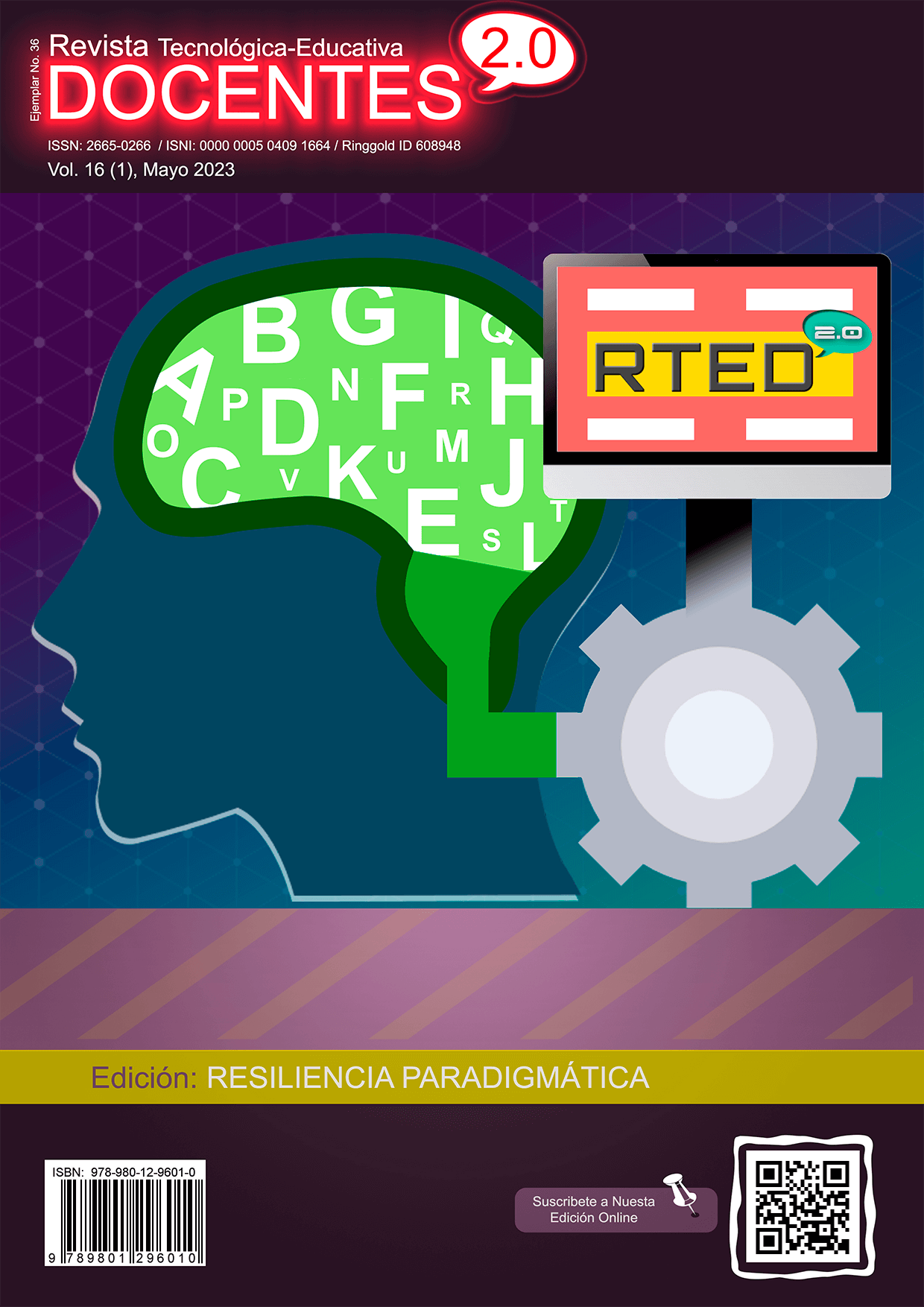Instructional Strategies to Develop Mathematical Logical Thinking
 DOI:
https://doi.org/10.37843/rted.v16i1.355
DOI:
https://doi.org/10.37843/rted.v16i1.355
Main Article Content
Abstract
In the area of mathematics, based on the education curriculum, at the different levels of primary, secondary, and middle school, it is considered important for the learning of the student, since through which basic knowledge can be obtained to develop competencies, which facilitate the being function in different scenarios and solve problems to take solutions assertively. The general objective will be to evaluate the impact provided by the use of instructional strategies applied by the teacher of the mathematical area in the search for the strengthening of mathematical, logical thinking in students of the educational institutions of the Maicao municipality of Colombia. The research was framed in the inductive method, positivist paradigm, descriptive, quantitative approach, non-experimental design, and transectional cut. The population is made up of thirteen managers and twenty-seven teachers; the technique used to collect information will be the survey directed to the referenced personnel. Data analysis and interpretation processing will be done through data analysis and interpretation, with statistical procedures of arithmetic mean and standard deviation. The discussion of the results of the study, as it is in the phase of applying the instruments and gathering information, cannot yet be presented. In conclusion, it is present in many educational institutions in the Maicao municipality at its different levels, displaying in some teachers certain failures during the teaching of mathematical skills to students, which affects so that they are not development optimally in students.
Downloads
Metrics
Article Details

This work is licensed under a Creative Commons Attribution-NonCommercial-NoDerivatives 4.0 International License.
Those authors who have publications in our journal accept the following terms:
- When a work is accepted for publication, the author retains rights of reproduction, distribution of his/her article for exploitation in all countries of the world in the format provided by our magazine and any other magnetic medium, optical, and digital.
- Authors will retain their copyright and guarantee the journal the right first to publish their work, which will be simultaneously subject to the Creative Commons Acknowledgment License (Attribution-NonCommercial-NoDerivatives 4.0 International (CC BY-NC-ND 4.0)). That allows third parties to copy and redistribute the material in any medium or format, under the following conditions: Acknowledgment - You must properly acknowledge authorship, provide a link to the license, and indicate if any changes have been made. You may do so in any reasonable way, but not in a way that suggests you have the licensor's endorsement or receive it for your use. NonCommercial - You may not use the material for a commercial purpose. NoDerivatives - If you remix, transform, or build from the material, you cannot broadcast the modified material. There are no additional restrictions - You cannot apply legal terms or technological measures that legally restrict you from doing what the license allows.
- Authors may adopt other non-exclusive license agreements to distribute the published version of the work (e.g., deposit it in an institutional archive or publish it in a monographic volume) provided that the initial publication in this journal is indicated.
- Authors are allowed and recommended to disseminate their work through the Internet (e.g., in institutional telematic archives, repositories, libraries, or their website), producing exciting exchanges and increasing the published work's citations.
- Request of withdrawal an article has to be done in writing by the author to the Editor, becoming effective after a written response from the Editor. For this purpose, the author or authors will send correspondence via e-mail: [email protected].
- The author will not receive financial compensation for the publication of his work.
- All Docentes 2.0 Journal publications are under the Open Journal System (OJS) platform at: https://ojs.docentes20.com/.
References
Arias, F. G. (2012). El proyecto de investigación. Introducción a la metodología científica. 6ta. Episteme. https://acortar.link/rOrIWA
Balestrini-Acuña, M. (2006). Cómo se elabora el proyecto de investigación. Distribución. BL Consultores Asociados.
Bavaresco de Prieto, A.M. (2013). Proceso metodológico en la investigación (Cómo hacer un diseño de investigación). 6ta edición. Imprenta Internacional, CA. https://acortar.link/7gfvZL
Bejarano-Rodríguez, A. (2022). Incidencia del uso de software educativo en el fortalecimiento de competencias matemáticas en estudiantes del tercer grado de la Institución Educativa Cerritos, municipio El Retorno, Guaviare. Universidad Nacional de Colombia. https://repositorio.unal.edu.co/handle/unal/83165
Correa-Murillo, E. Y., Córdoba Valois, H. D., & Parra Palacios, S. M. (2019). Estrategias pedagógicas para el mejoramiento de la comprensión lectora y su incidencia en la resolución de problemas matemáticos en estudiantes de sexto grado de la Institución Educativa Pedro Grau y Arola de la ciudad de Quibdó. http://hdl.handle.net/11407/6304
Forero, D. & Saavedra, V. (2019). Los 10 pasos para hacer de Colombia la mejor educada de América Latina. Fedesarrollo. http://hdl.handle.net/11445/3761
Ferreres, V., & González, A. (2006). Evaluación para la mejora de los centros docentes. Praxis. https://acortar.link/d8hfTR
Hernández-Sampieri, R., Fernandez-Collado, C, & Batista-Lucio, P. (2003). Metodología de la investigación. 4. McGraw-Hill.
Hernández-Sampieri, R. & Mendoza-Torres, C. P. (2018). Metodología de la investigación (Vol. 4). McGraw-Hill. https://acortar.link/F9R0Re
ICFES (2021). Informe de resultados históricos pruebas saber ETC Guajira. https://diae.mineducacion.gov.co/dia_e/documentos/La%20guajira.pdf
Jiménez-Espinosa, A. (2019). La dinámica de la clase de matemáticas mediada por la comunicación. Revista de Investigación, Desarrollo e Innovación, 10(1), 121–134. https://doi.org/10.19053/20278306.v10.n1.2019.10016 DOI: https://doi.org/10.19053/20278306.v10.n1.2019.10016
Martín y Rodríguez (2010). Metodología de la Investigación Cuantitativa. Fondo Editorial de la Universidad Pedagógica Experimental Libertador 1era reimpresión. Caracas Venezuela.
Méndez, J. (2007). Proceso Metodológico. Editorial Fontanelli.
OECD (2019). Informe de resultados del Programa para la Evaluación Internacional de Alumnos (PISA) 2018. https://www.oecd.org/pisa/publications/PISA2018_CN_COL_ESP.pdf
Ruetti, E., & Cuenya, L. (2010). Controversias epistemológicas y metodológicas entre el paradigma cualitativo y cuantitativo en psicología. Revista Colombiana de Psicología, 19 (2),271-277. https://www.redalyc.org/articulo.oa?id=80415435009.






